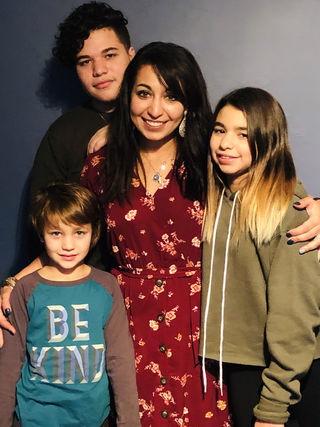Pregnancy
Experiencing the Unimaginable
Part II: Pregnancy loss.
Posted February 19, 2020 Reviewed by Lybi Ma
[Trigger Warning: Miscarriage is addressed directly below.]
When we started this series, we envisioned at least three parts. We wanted to discuss miscarriage but weren’t sure how to approach it because we didn’t research it directly for our book. Yet we both know people who have experienced pregnancy loss. For us, storytelling is a uniquely powerful tool for destigmatizing taboos.
We are deeply honored to share Dr. Liz Matheis’ story today. Her narrative is so powerful. Importantly: Liz hasn’t shared this publicly before. Liz is a child psychologist whose work specializes in treating the whole child, and she has an informative column on Psychology Today, which you can find here. We asked Liz a series of questions about miscarriage
Is miscarriage a useful term?
I experienced a miscarriage in between my first and second child. Reading the phrase is respectful but doesn’t embody the emotion that goes along with a miscarriage. I suffered a miscarriage because I was devastated by the loss of an 11-week pregnancy, a child I never met but lost. I was tormented internally for a year but didn’t feel that I could share the experience. I was embarrassed and I hid that I was hurting badly and for a long time. The experience of the loss was pretty intense for me. I grieved every day. I couldn’t stop thinking about the fact that I lost my baby. I would fall asleep at 9 p.m. out of sheer exhaustion each night and then wake up at 3 a.m. and was not able to fall back asleep. I stayed up and thought about everything I did, ate, wore, and how that could have contributed to the miscarriage. I was paralyzingly scared that my body would not be able to hold another child. I felt extremely out of control. I couldn’t focus at work; I was tired and irritable all of the time. My son was 1.5 years old, and I was afraid I was going to lose him, too.

I finally became pregnant four months later (the longest four months I have ever experienced in my life). During my entire pregnancy, I suffered from severe anxiety because I was so afraid to lose this baby too. That anxiety didn’t subside until the moment my daughter was born, and I could see, with my very own eyes, that she was healthy and alive. I know I am not alone when I say that it is a life-changing event to lose a child, even if the child was still so small.
Did you consider talking to someone about grief?
During that time, after I suffered the miscarriage, I should have been in therapy to help me process the loss, but I felt so ashamed and that it was my fault. I didn’t want to talk about it for fear of learning that I had done something that contributed or caused the loss of the pregnancy. I was heartbroken, I cried often and a lot. I was incapacitated and heartbroken for months to come. I felt like I was going through the motions but was empty inside.
I feel like society would say that I have been blessed with three kids so what’s one pregnancy loss? I don’t feel like there is room or space for the grief that comes after a pregnancy loss. But loss is loss and it hits people differently. Some people are able to make peace and move on, and some people hold onto it. It becomes a part of the “fabric.” It’s a part of my story.
What did you need most at the time?
I needed permission to grieve and time for my body to heal. I felt absolutely horrible, physically, for months to come. My mind and body were in a horrible place where I didn’t have the energy, I felt sad all of the time, my sleep-wake cycle was off, and the world felt like it had lost its color; everything was gray for a long time.
How can we support those during and after a pregnancy loss?
Offer a shoulder to cry on, validate her experience and don’t try to find the silver lining; there is no silver lining, even if she has already had a child. Offer comfort, company, and space and time to grieve. Listen to her fears, worries, even the darkest of them and don’t react strongly or tell her, “Don’t feel that way. You’ll get pregnant again.” Those are hurtful words. I also think it would be helpful for employers to offer grief and bereavement time for women who have suffered a pregnancy loss. There is the physical healing that is not spoken of; the hormone levels now have to readjust and if you’ve had a DNC, you’ve undergone surgery with anesthesia.
We often forget that those who have suffered a pregnancy loss are postpartum. There is an enormous gap here. After her loss at 13 weeks, this is what @johnsonquinlanresearch shared with us on Instagram: “I carried my passed baby for 1 week (that’s where the deep pain and loneliness came in). [Afterwards] I went into such a postpartum depression… I felt like people would say, ‘oh you’re just sad you lost the baby.’ And yes, I was, but I was also a hormonal mess and that was a lot for people to understand."
*Everything shared with interviewees’ permission*
References
Further resources/sites to bookmark:
Why Pregnancy Loss Deserves our Attention
Supporting Friends & Family Through Loss
How to Support Someone Going Through Pregnancy Loss
The Dos and Don’ts of Supporting Women After a Miscarriage
Books we highly recommend:
Lara Freidenfelds’ The Myth of the Perfect Pregnancy: A History of Miscarriage in America
Rachel Silverman and Jay Baglia’s Communicating Pregnancy Loss: Narrative as a Method for Change




